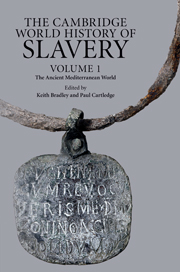Book contents
- Frontmatter
- Contents
- Series editors' introduction
- List of figures
- Acknowledgements
- Introduction
- 1 Slavery in the ancient Near East
- 2 Slaves in Greek literary culture
- 3 Classical Athens
- 4 The Helots: a contemporary review
- 5 Slavery and economy in the Greek world
- 6 The slave supply in classical Greece
- 7 Slavery and the Greek family
- 8 Resistance among chattel slaves in the classical Greek world
- 9 Archaeology and Greek slavery
- 10 Slavery in the Hellenistic world
- 11 Slavery and Roman literary culture
- 12 Slavery in the Roman Republic
- 13 Slavery Under the Principate
- 14 The Roman slave supply
- 15 Slave labour and Roman society
- 16 Slavery and the Roman family
- 17 Resisting slavery at Rome
- 18 Slavery and Roman material culture
- 19 Slavery and Roman law
- 20 Slavery and the Jews
- 21 Slavery and the rise of Christianity
- 22 Slavery in the late Roman world
- Bibliography
- General index
- Index of ancient passages cited
- Index of inscriptions and papyri
- Index of Jewish and Christian Literature Cited
11 - Slavery and Roman literary culture
Published online by Cambridge University Press: 28 September 2011
- Frontmatter
- Contents
- Series editors' introduction
- List of figures
- Acknowledgements
- Introduction
- 1 Slavery in the ancient Near East
- 2 Slaves in Greek literary culture
- 3 Classical Athens
- 4 The Helots: a contemporary review
- 5 Slavery and economy in the Greek world
- 6 The slave supply in classical Greece
- 7 Slavery and the Greek family
- 8 Resistance among chattel slaves in the classical Greek world
- 9 Archaeology and Greek slavery
- 10 Slavery in the Hellenistic world
- 11 Slavery and Roman literary culture
- 12 Slavery in the Roman Republic
- 13 Slavery Under the Principate
- 14 The Roman slave supply
- 15 Slave labour and Roman society
- 16 Slavery and the Roman family
- 17 Resisting slavery at Rome
- 18 Slavery and Roman material culture
- 19 Slavery and Roman law
- 20 Slavery and the Jews
- 21 Slavery and the rise of Christianity
- 22 Slavery in the late Roman world
- Bibliography
- General index
- Index of ancient passages cited
- Index of inscriptions and papyri
- Index of Jewish and Christian Literature Cited
Summary
INTRODUCTION
Slaves are everywhere in Roman literature. They serve masters faithfully or plot their undoing in Roman comedy. They are topics of concern in agricultural manuals. They act as go-betweens in love poetry and as figures of ridicule and disdain in satire. They make revolts in histories and sacrifice themselves to masters in collections of paradigmatic stories (exempla). They figure in the letters of famous Romans like Cicero and Pliny the Younger. Roman authors dismiss them, love them, hate them and sometimes ignore them. In their writings, slaves receive whippings or rewards, serve or betray masters, stand as moral paradigms and blend into scenery of house, city and fields.
Since Rome was a slave society from the late third century bc to the third century ad, the presence of slaves in its literature will not surprise its readers two thousand years later. Yet, how we understand the ubiquitous literary presence of slaves is no easy matter. The literary scholar observes the tropes and figures that deploy the slave; the social historian finds evidence of the realities of the institution and even of the experience of slaves; and the cultural historian looks for the attitudes, notions and ideology associated with these realities. Although this chapter partakes of all these approaches, it focuses on the work of cultural history. I examine a selected group of Latin authors as representative of both Roman literature from the late third century bc to the early second century ad and the appearances of slaves in it.
- Type
- Chapter
- Information
- The Cambridge World History of Slavery , pp. 214 - 240Publisher: Cambridge University PressPrint publication year: 2011
- 8
- Cited by



